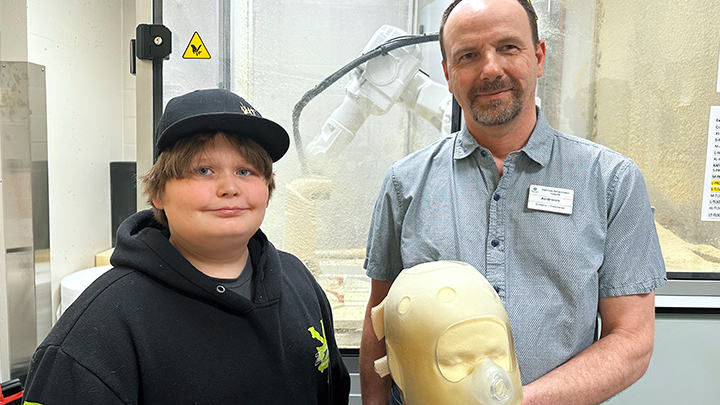
March 20, 2024

Andreas Donauer, orthotist at the Glenrose Rehabilitation Hospital, shows off the new seven-axis robotic carver that was used to make a foam replica of Rowan McNair’s head. Photo by Sharman Hnatiuk.
Story & photo by Sharman Hnatiuk
EDMONTON — Sleepless nights no longer plague gaming enthusiast Rowan McNair — not since the new seven-axis robotic carving machine at the Glenrose Rehabilitation Hospital helped the 11-year-old get his much-needed Z’s.
McNair has a rare disorder that includes symptoms of sleep apnea. For years, McNair lived with the pain of rashes and pressure sores bought on by his continuous positive airway pressure (CPAP) mask that delivers oxygen as he sleeps.
“The pain resulted in him not wanting to wear the mask, or ripping it off in the night,” says Angela McNair, Rowan’s mother. “We struggled for years to find an adaptive solution to help him get through the night without discomfort.”
Rowan was referred to the Glenrose where he met Andreas Donauer, an orthotist at the hospital.
Donauer took 3D images of his head to create digital files that were sent to the new carver. In minutes, it created an exact foam replica of Rowan’s head. Donauer used it to make a flexible helmet with straps to secure a precise, more comfortable fit for Rowan’s CPAP mask. Today, he’s now sleeping comfortably through the night with his mask on.
The robotic carver allows orthotists and prosthetists to forgo the traditional time-consuming plaster-casting methods with a faster digital approach that relies upon 3D shape capture and design software and automated model carving to replicate any body part from head to foot. The carver also helps to fit artificial limbs and orthotic devices for 1,500 patients across Alberta each year.
Glenrose staff began training on the new robotic carver last spring and began using it for patients last June. Previously, staff had been using a three-axis carver, but the equipment became outdated and irreparable — so an urgent upgrade request was made to alleviate any delays for patients in need.
In just six months, donors to the Glenrose Hospital Foundation — including the Edmonton Civic Employees Charitable Assistance Fund, The Stollery Charitable Foundation, The Allard Foundation, The Baldwin Family Foundation, and Ivan Radostits in memory of Mary Agnes Radostits — raised $500,000 towards the purchase of the seven-axis robotic carving machine, giving AHS teams access to the most advanced carving capabilities on the market.
“If you think of the challenge of making a plaster cast of a patient’s head — especially a pediatric patient, or a torso for a patient who needs a spinal brace — the process was labour-intensive and time-consuming for staff, and I’m sure unpleasant for patients at times,” says Donauer.
“Access to the robotic carver helps speed up the process from patient assessment to fitting a patient with a limb or brace, helping inpatients get their devices sooner, and improving rehab outcomes.”